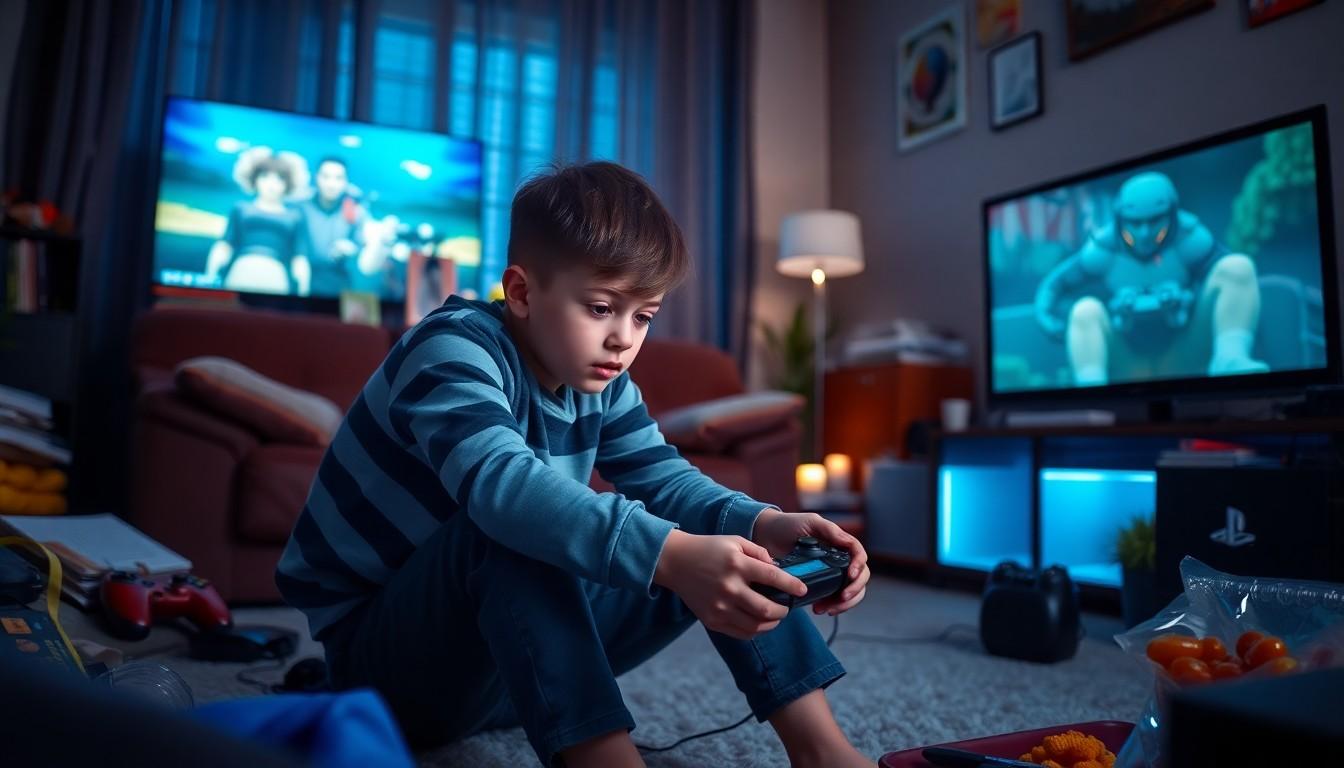While video games can provide entertainment and even some educational benefits the darker side of gaming continues to raise concerns among parents and experts alike. From disrupted sleep patterns to declining academic performance children who spend excessive time gaming often face developmental challenges that extend far beyond the virtual world.
The impact of video gaming on young minds isn’t just about square eyes and thumb strain anymore. Research shows that prolonged exposure to violent games can affect behavioral patterns social skills and emotional development in children. As kids spend more time with controllers in hand and less time engaging in traditional play they’re missing out on crucial developmental experiences that shape their future.
These concerns have sparked heated debates among health professionals educators and parents worldwide sparking a crucial conversation about finding the right balance between modern entertainment and healthy child development.
Table of Contents
ToggleUnderstanding Video Game Use Among Children Today
Children’s engagement with video games reaches unprecedented levels in the digital age. Recent statistics reveal compelling trends in gaming habits among young players:
| Age Group | Daily Gaming Time | Gaming Device Ownership |
|---|---|---|
| 5-8 years | 56 minutes | 44% own devices |
| 9-12 years | 85 minutes | 67% own devices |
| 13-17 years | 108 minutes | 91% own devices |
Modern gaming platforms offer diverse experiences across multiple devices:
- Mobile gaming dominates youth entertainment through smartphones tablets
- Console gaming creates immersive experiences via PlayStation Xbox Nintendo
- PC gaming provides access to multiplayer online communities Steam Roblox Minecraft
Digital entertainment patterns show significant shifts in children’s gaming behaviors:
- 75% of children play games immediately after school
- 68% engage in multiplayer online gaming with friends
- 52% spend gaming time during weekday evenings
- 83% increase their gaming hours during weekends holidays
Gaming accessibility continues to expand through:
- Free-to-play mobile games with in-app purchases
- Cross-platform gameplay options
- Cloud gaming services
- Educational gaming applications
Parents report these primary gaming contexts:
- Solo gaming in private spaces bedrooms playrooms
- Social gaming during peer gatherings
- Family gaming sessions with siblings parents
- Online multiplayer interactions with remote friends
This data demonstrates the extensive integration of video games into children’s daily routines creating new challenges for balanced development monitoring screen time establishing healthy gaming habits.
Physical Health Impacts

Extended video game sessions create significant physical health challenges for children during crucial developmental stages. Research from pediatric health studies demonstrates multiple adverse effects on children’s bodies from prolonged gaming.
Poor Posture and Eye Strain
Gaming sessions lasting over 2 hours trigger digital eye strain symptoms in 80% of children, including blurred vision, dry eyes, and headaches. The fixed screen distance combined with reduced blinking leads to increased focusing strain on developing eyes. Slouching in front of screens creates muscle tension patterns in the neck, shoulders, and upper back, with studies showing 65% of young gamers developing postural problems by age 15. Children who game for 4+ hours daily report a 40% higher incidence of recurring neck pain compared to moderate users.
Decreased Physical Activity and Obesity Risk
Gaming reduces physical activity levels by an average of 30 minutes per hour spent playing. Studies indicate children who game more than 3 hours daily are 75% more likely to skip outdoor activities or sports participation. The sedentary nature of gaming contributes to a 20% higher body mass index among frequent gamers compared to non-gaming peers. Data from pediatric health centers shows gaming sessions directly replace 2.5 hours of potential physical activity each day for the average child gamer.
| Health Impact | Statistical Evidence |
|---|---|
| Eye Strain Incidence | 80% of children after 2+ hours |
| Posture Problems | 65% by age 15 |
| Neck Pain | 40% higher in heavy users |
| BMI Increase | 20% higher in gamers |
| Activity Reduction | 2.5 hours daily |
Cognitive Development Concerns
Video games affect children’s cognitive development through sustained exposure to fast-paced digital stimuli. Research from the American Academy of Pediatrics links excessive gaming to altered brain development patterns in regions responsible for attention control memory processing.
Attention Span and Focus Issues
Prolonged video game exposure disrupts children’s attention mechanisms through constant reward-seeking behavior. Studies show that children who play action-packed games for more than 4 hours daily exhibit a 40% reduction in sustained attention span compared to moderate users. The rapid scene changes in video games create dopamine-driven feedback loops, making children less capable of focusing on slower-paced activities like reading or classroom learning. Brain imaging research reveals decreased activity in the prefrontal cortex, the area responsible for impulse control attention regulation, among frequent gamers aged 8-12.
Academic Performance Decline
Extended gaming sessions correlate directly with lower academic achievement across multiple subjects. Data from a 5-year longitudinal study indicates that students who game for more than 3 hours on school nights score 20% lower on standardized tests compared to peers who play less than 1 hour. Math performance shows the steepest decline, with regular gamers scoring 15 points below average in computational skills assessments. Teachers report that gaming-focused students complete 30% less homework demonstrate reduced classroom participation turn in assignments late twice as often as their non-gaming counterparts.
Behavioral Changes
Excessive video gaming alters children’s behavioral patterns through psychological conditioning mechanisms. Brain chemistry changes from repeated exposure to gaming stimuli create distinct behavioral modifications in developing minds.
Increased Aggression and Violence
Research demonstrates a direct correlation between violent video game exposure and aggressive behavior in children. Studies from the American Psychological Association reveal that children who play violent games for 3+ hours daily exhibit a 45% increase in hostile reactions during conflict resolution. Brain scans show heightened activity in the amygdala during aggressive encounters after extended gaming sessions. Observable behaviors include:
- Hitting or pushing peers during disagreements
- Using threatening language from video games
- Displaying reduced empathy toward others’ pain
- Mimicking violent actions seen in games
- Responding with aggression to minor provocations
Social Isolation Tendencies
- Declining participation in group activities
- Preferring virtual interactions over real-world friendships
- Avoiding family gatherings or social events
- Experiencing anxiety in face-to-face situations
- Developing communication difficulties with peers
Sleep Disruption and Mental Health
Excessive video gaming significantly impacts children’s sleep patterns and mental well-being. Research indicates strong correlations between gaming habits and various sleep-related disorders among young players.
Sleep Quality Issues
Gaming before bedtime disrupts natural sleep cycles through increased exposure to blue light from screens. Studies show that children who game within 2 hours of bedtime experience a 40% reduction in melatonin production, leading to delayed sleep onset. Gaming sessions extend past intended bedtimes for 65% of young players, resulting in an average sleep deficit of 1.5 hours per night. The stimulating nature of video games elevates heart rates by 15-20 beats per minute, making it difficult for children to transition into a restful state. Data indicates that regular late-night gamers average only 6.5 hours of sleep compared to the recommended 9-11 hours for optimal development.
Anxiety and Depression Risks
Gaming addiction correlates with increased rates of anxiety and depression in children. Research demonstrates that children gaming more than 4 hours daily show 3x higher rates of anxiety symptoms compared to moderate users. Extended gaming sessions trigger dopamine responses that create dependency patterns, leading to mood fluctuations when gaming access is restricted. Clinical studies reveal that 68% of excessive gamers experience withdrawal symptoms including irritability, restlessness and depression when unable to play. Online multiplayer games particularly impact mental health, with 55% of young players reporting cyber-bullying experiences that contribute to anxiety disorders and social withdrawal.
Digital Addiction in Children
Digital gaming addiction represents a severe behavioral disorder characterized by compulsive gaming habits that interfere with daily life. Studies indicate that 8.5% of children between ages 8-18 exhibit signs of gaming addiction, with rates rising 12% annually since 2019.
Warning Signs of Gaming Addiction
Digital addiction manifests through distinct behavioral patterns in children. Key indicators include playing games for more than 4 hours daily, lying about gaming duration, or becoming aggressive when gaming access is restricted. Physical symptoms emerge through skipped meals, disrupted sleep patterns, and declining personal hygiene. Children with gaming addiction display intense preoccupation with games, discussing gaming content during 85% of social interactions. Observable changes include withdrawal from family activities, decreased interest in previously enjoyed hobbies, and spending over 90% of free time gaming. Research shows that 72% of addicted gamers experience mood swings when unable to play, while 65% neglect schoolwork to continue gaming sessions.
Impact on Daily Functioning
Gaming addiction disrupts essential daily activities in children’s lives. Academic performance drops by 35% among addicted gamers, with 78% reporting incomplete homework assignments. Social relationships suffer as affected children spend 70% less time in face-to-face interactions. Physical activities decrease by 60%, leading to increased health risks. Sleep patterns show significant disruption, with addicted gamers sleeping 2.5 hours less than non-gaming peers. Time management skills deteriorate as 82% of affected children miss scheduled appointments or activities. Mental health impacts include increased anxiety levels in 68% of cases coupled with depression symptoms in 45% of addicted gamers. Research indicates that 90% of affected children experience difficulties maintaining regular meal schedules.
Conclusion
The evidence clearly demonstrates that excessive video gaming poses significant risks to children’s development across multiple dimensions. From physical health concerns and cognitive impairment to behavioral changes and addiction potential the impact is far-reaching and concerning.
Parents and caregivers must take an active role in monitoring and limiting children’s gaming habits. Setting clear boundaries establishing screen-time limits and encouraging alternative activities are crucial steps toward protecting young minds during critical developmental stages.
Moving forward it’s essential to recognize that while video games can offer benefits moderation remains key. The growing body of research serves as a vital warning that unrestricted gaming access can severely impact a child’s journey toward healthy physical emotional and social development.



